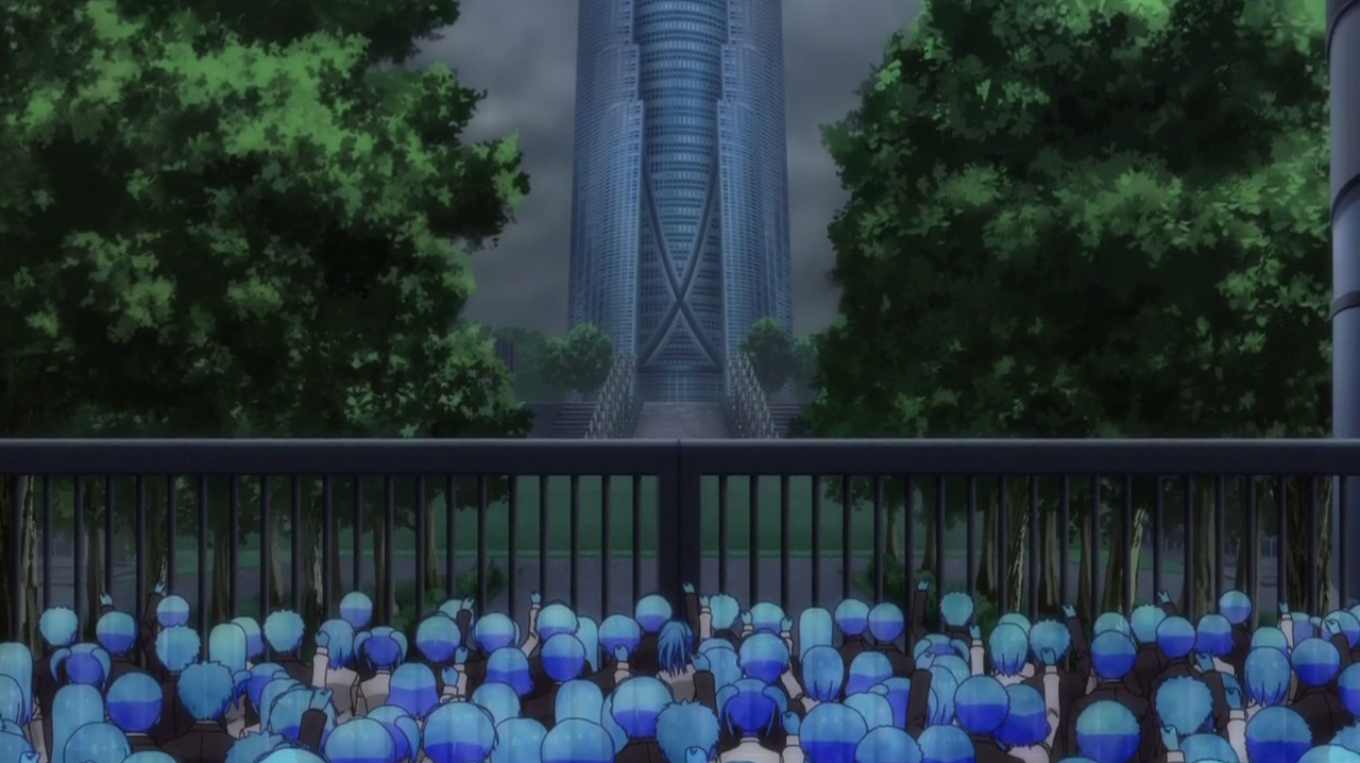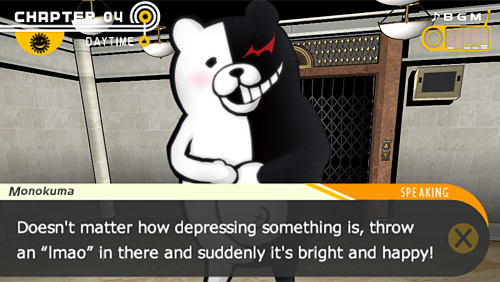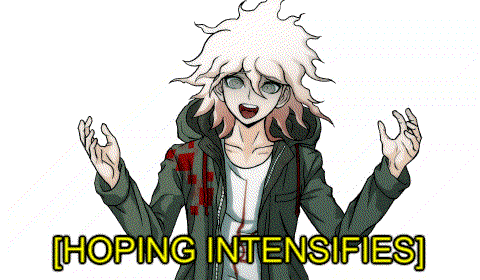I’ve been thinking for a while about making a little essay on Kishi Seiji, who is slowly becoming one of my favorite directors. I fell in love with his directing in Ranpo Kitan, and was very much impressed by Dangan Ronpa 3 intertwined arcs which may well be the biggest experimentation on format since Endless Eight. We’ll be focusing on these two works and heavily spoiling them, so consider yourself warned (as in go watch these anime and come back). A lot of these points probably deserve to be expanded, but I tried to gloss over everything to give you food for thoughts. And you know it’s gonna be serious because the title is not “Dangan Ranpo”.
1. Boredom, eliteness and isolation
Ranpo Kitan opens up on a very grim scene that portrays a sad Kobayashi looking out the window in a grayscale world. Around him, people are just vague silhouettes who all look the same. The message is cristal clear: this kid feels lonely, longing for some kind of escape in a world filled with monotonous dolls.
http://yo252yo.tumblr.com/post/123134586543/aineh-this-world-we-live-in-is-a-dream-the
However, Kishi Seiji’s approach has an undeniable oppressive aesthetics that carries the whole show and culminates in what is to me one of the most powerful moments of the show: when Kobayashi realizes that his best friend is, too, yet another human being alien to him and he is utterly alone.
http://yo252yo.tumblr.com/post/128286990743/fililikilili-things-that-are-not-okay-this
Now it’s no wonder why Seiji uses this technique in Dangan Ronpa too. One of the core element of Dangan Ronpa is the notion of “Super High School Level”. All the students at Hope’s Peak Academy have a special talent developed at an elite level that places them above and outside the world of commoner. The events of DR3 (especially Zetsubou) are centered around the tension this gap between the elites and the non-elites create, especially in the light of the opening of the academy to the new un-gifted reserve students.

Among the elite is the girl who started it all, Super High School Level Despair, Enoshima Junko. She’s without a doubt the most central character in this saga. And her super talent is despair. Let that really sink in for a while. Her specialty is being in despair.
 Contrary to Kobayashi, a few people around her are not silhouettes, but there is no doubt that she feels similar to him. Even among the elite students, she’s still a loner. She’s an elite among elites, just like Kamukura. The students of Hope Peak’s sometimes have very silly talents (Hope, Luck, Heir, Fortune teller…), turning to ridicule the very conception of eliteness. They become Junko’s pawn, highlighting that even though they may not seem like common folks to an innocent bystander, everybody is a silhouette for someone like her.
Contrary to Kobayashi, a few people around her are not silhouettes, but there is no doubt that she feels similar to him. Even among the elite students, she’s still a loner. She’s an elite among elites, just like Kamukura. The students of Hope Peak’s sometimes have very silly talents (Hope, Luck, Heir, Fortune teller…), turning to ridicule the very conception of eliteness. They become Junko’s pawn, highlighting that even though they may not seem like common folks to an innocent bystander, everybody is a silhouette for someone like her.

As the shows develop, it becomes pretty clear that Kobayashi and Junko (and Kamukura) are incredibly smart geniuses, only on par with the greatest criminals or detectives. Their intellect separates them from the common folk and plunges them into isolation. They know and understand things to levels where noone can follow, and it’s really heartbreaking to see the moment where Hashiba cannot keep up.
Junko has always been important in Dangan Ronpa, but we did not know much about her motivations before Seiji’s animation. Her discussions with Izuru Kamukura are the most enlightening: in short, just like Kobayashi, she finds the world unbearably boring and predictable. So does Izuru Kamukura, by the way. Her talent makes life untolerable for her. Is depression an unavoidable companion of brilliant minds?


Note that Junko, much like all the other Super High School Level, gets her ability naturally. She’s born with it and doesn’t have to fight for it, and in the same way she cannot get rid of it. Super High School talents are presented as a non negotiable gift that makes the reserve students jealous. But what I want to emphasize here is that this unfair blessing of some is also a non negotiable curse imposed onto them by genetics. Junko is doomed to be smart, lonely and depressed, a condition she simply cannot escape.

Obviously, I couldn’t deal with the notion of elites without bringing in the master of the Ubermensch, sir Nietzsche. For interestingly enough, in Thus Spoke Zarathustra, he points out that loneliness is unavoidable for whoever follows the path of the Ubermensch:
http://yo252yo.tumblr.com/post/138251766633/yea-my-friend-the-bad-conscience-art-thou-of-thy
To him, this is a necessary condition to push oneself towards betterment and further creation. And sure enough, we’ll see that this isolation clearly drives our characters to become actors. Kobayashi will solve crime, Enoshima will dye the world in despair. However Kamukura will position himself as an arbiter in the upcoming world wars.
http://yo252yo.tumblr.com/post/138251853803/would-that-ye-could-not-endure-it-with-any-kind-of
2. Breaking the boredom
The core vector of their isolation is their superior abilities, which allow them to know how everything will happen, making the world unbearably mundane. Is this a necessary byproduct of intelligence?
http://yo252yo.tumblr.com/post/129305166408
This could well be, for intelligence is bound to result in understanding the laws of the universe, and predicting their outcome. The theme of predictability of the world is even echoed by the main topic of Ranpo Kitan: Game of Laplace: determinism, building up on an original idea by Laplace. It is all about this algorithm which would, much like Asimov’s psychohistory, predict the whole world.
http://yo252yo.tumblr.com/post/128177789543/a-new-otp-forms-around-my-favorite-concept
What about randomness? one may ask. This theme is dealt with extensively through the saga, most notably through the character of Komaeda, whose super level talent is luck. The intertwining format of Dangan Ronpa 3 shines the brightest showing us how Komaeda’s random luck ripples through time and affects pretty much everything by butterfly effect (for instance the feud between bonbon-girl and pharmacy-chan). But these domino effects are suspiciously perfect, and the fact that Luck or Fortune telling are genetic talents are here to remind us that there is no such thing as randomness and even luck is predestined.
http://yo252yo.tumblr.com/post/150168118976/meaning-of-life-according-to-komaeda
In a deterministic universe, every consequence is simply the result of causes. But more than existential anguish over the lack of free will, our characters are mainly bored. Untolerably so, because their superior intellect makes them immune to any kind of Pascalian diversion. To echo the gambling metaphor Pascal loved, blackjack loses all its interest if you can predict everything perfectly. May I remind you that Pascal and Monokuma are the two people I know who used the word “game” so much

We must therefore imagine these characters tortured by the prospect of their own finitude, and completely unable to distract themselves. Drowning in Super High School Level Despair, if you will. They all desperately strive for something that escapes their predictive capabilities. No matter the cost, they need to break free from the smothering of their all seeing intellect.
http://yo252yo.tumblr.com/post/123134583143
The solace they find seems to be in the extremes of human behaviors, like murders and violence. Kobayashi’s comfort is in complex crimes. Junko develops an obsession with plunging the world into chaos. Kamukura goes one meta-level beyond and indulges in the extremes of Junko’s own behavior (and her opponents).
http://yo252yo.tumblr.com/post/123134599323/dollfishu-talk-about-being-messed-up-on-so-many
For people so smart that they can predict human behavior, are humans pushed to their limits, as gruesome and obsene as they may become. the only thing that can escape foresight? That may not even be the case, considering how deterministically Junko’s ascent into Zestubou was orchestrated…
http://yo252yo.tumblr.com/post/151353068298
But just like the common folk’s distractions are ultimately deterministic, maybe this elite’s distractions are a mere illusion too, and there is no real escape.
3. The vicious cycle of despair and hope
We cannot talk about Dangan Ronpa without dealing with the weird psychology of Komaeda. Dangan Ronpa is about extremes. It is the battle between two extremes drawn to an absurd level: blind hope, and relentless despair. But more than triumphing, it seems that champions of these factions merely want to escalate the conflict to the most intense possible point. Komaeda strives for a Despair as powerful as possible to make Hope shine brighter, whereas Junko rejoices that the Hope she’s faced with seems good enough for her Despair.

Of course they justify this urge for escalation by wanting a total victory of their camp, but is it really necessary? One cannot ignore the similarity in their approach, which makes the line between the faction even more blurry. Each stepping stone for Hope serves as a new challenge to make Despair more powerful, and vice versa.
http://yo252yo.tumblr.com/post/151419799153/examine-the-lives-of-the-best-and-more-fruitful
This echoes the Nietzschean conception of betterment through challenge and adversity. To him, the elites builds themselves by facing the challenges and thereby becoming stronger. Therefore, shielding people from adversity is condemning them to mediocrity. That’s the core of the disagreement between Mitarai and the others at the end of the Mirai arc: knowing how irremediably flawed humans (and himself) are, he wants to shield them.
http://yo252yo.tumblr.com/post/151309343078/this-was-actually-interesting-psychology
But mostly, the stepping stone paradigm draws a confusion between the two camps that culminates in the gigantic mess that is the Mirai arc, where all the core members of the Hope faction start butchering each other in a very Zestubou fashion without much resistance… Ambiguity and hypocrisy are omnipresent.
http://yo252yo.tumblr.com/post/151309344173/junko-pointing-out-the-hypocrisy
It’s no wonder that Kamukura disengages completely from these petty games. Up until the very end, the elite of elites will simply stand aside as an observer. He’s uninteresting in propagating chaos or fighting it. Could it be because taking part in this would obviously tilt the outcome and make it more determined and boring? That he does not want to taint the narrative by his participation? Is that why DR3 is an anime and not a game? He takes the opposite approach of Junko, and decide to watch the events unfold naturally, without influencing them or orchestrating a show.
http://yo252yo.tumblr.com/post/151481246988
4. Memes and Meta with Mitarai
Now Kamukura is not the only “watcher” in Dangan Ronpa. In fact, the theme of television, media and observation is omnipresent ever since DR1. Even in DR3, Monokuma insists repeatedly that the killing games are broadcast to the world. For the watchees, this openness in the process can start interesting discussions about Sartre and how the gaze of others is instrumental in revealing and constructing your self. But Dangan Ronpa focuses on the watchers.

The murders in Dangan Ronpa are supposed to bring despair through the world thanks to being broadcast. The psychological effects of viewing something is in fact the main reason for the mutual killings in DR1, as well as the main vector of action of Enoshima Junko. The mutual killing game makes no sense without an audience. The Zetsubou arc is centered around her meeting with animator Ryouka Mitarai, and how it will allow Junko to leverage the power of subliminal imagery to brainwash people into killing each other or forgetting things.
http://yo252yo.tumblr.com/post/149659992208
But is this really hypnose? All of this sounds like run of the mill animation technique, little details you’d iron in any artistic endeavour. Sure, the format is adapted to the purpose, and very very well so. However, the heart of the matter seems to remain in the content, as justified by the length Junko goes through to orchestrate it. Her targets are Hope Peak’s student precisely because of the meaning behind it and the symbol they represent. See for yourselves:
In her conversation with Kamukura, we learn more about how important the content is. Her work is all about spreading despair, spreading ideas. Ideas that spread to populations through these broadcasts, and there’s a word for that: memes.
http://yo252yo.tumblr.com/post/151257731983
Memes, infection information, is another central theme of Seiji’s work. In particular, Ranpo Kitan’s main storyline is about Twenty Faces, a vigilante serial killer, of whom we come to learn that he’s not a person but a concept embodied by several people and spread by meme. Twenty Faces is a perfect example of meme, with him being an idea that took out a life of its own and survives its creator (see this article 🙂). Likewise, Enoshima Junko’s despair, embodied in Monokuma, is the same, and survives beyond her death. It spreads through time, but also through universes up to the real world.

Indeed, when seeing Mitarai, it’s pretty hard to forget that this whole thing as another level. Yes, people in the world of DR are watching the killings broadcast, but so are we, spectators of the anime. Monokuma often reminds us of that fact, prompting us to sit back and enjoy the show. Didn’t we watch the mutual killings in DR1 or the student council video right above? Aren’t we as subject to the effect of this video as the characters in the show that turned crazy while watching it? Doesn’t that make us all citizens of a world that is falling in despair, and thereby, complacent?

Dangan Ronpa echoes pretty obviously the reality television of our world, reusing without hiding it all its tropes. We’re faced with a dire version of the Big Brother’s House, with daily challenges and weekly eliminations. DR3 Mirai is a glorified game of Mafia. The emphasis is clearly on show and spectacle, almost theatrality (which can be a great way to dive into the topic of human nature, see Hamlet, etc…). It keeps remininding us that our worlds are not too far apart, and we’re just one step away from descending into chaos. And it’s also a nice reflective point about the unhealthy fact that we’re already tapping in the entertainment potential of humans pushed to their limits.
http://yo252yo.tumblr.com/post/127531710085
Junko’s message lives in the world of semantics, spreads through the universes and affects its audience both within and outside the show. So too does Seiji’s message affect us. Does he, like Mitarai, want to change the world with his anime? Probably. But I think he mostly wants to provide shows that are an escape for the bored Kobayashi types out there, maybe to stop us from using real people as entertainment dolls.
http://yo252yo.tumblr.com/post/151309342333/hideo-kojima-2016

Leave a comment